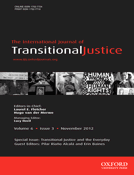
International Journal of Transitional Justice
Scope & Guideline
Contributing to the Discourse of Justice and Peace
Introduction
Aims and Scopes
- Interdisciplinary Analysis of Transitional Justice:
The journal engages with various fields including law, political science, sociology, and history to explore the complexities of transitional justice practices. - Focus on Marginalized Voices:
It emphasizes the experiences and perspectives of marginalized groups, including indigenous populations, women, and racial minorities, in the transitional justice discourse. - Evaluation of Transitional Justice Mechanisms:
Through empirical studies and theoretical discussions, the journal assesses the effectiveness of mechanisms such as truth commissions, reparations, and institutional reforms in achieving justice and reconciliation. - Global Perspectives on Justice:
The journal provides a platform for global perspectives, highlighting case studies from various regions including Africa, Latin America, and the Global South, enriching the understanding of transitional justice in different contexts. - Critical Engagement with Historical Contexts:
It encourages critical reflections on historical injustices and their ongoing legacies, linking past grievances to current transitional justice efforts.
Trending and Emerging
- Intersectionality in Transitional Justice:
There is a growing focus on intersectionality, examining how various identities (such as race, gender, and class) intersect within transitional justice frameworks, reflecting a deeper understanding of social complexities. - Environmental Justice and Transitional Justice:
Emerging discussions on the intersection between environmental issues and transitional justice indicate a trend towards addressing ecological harms alongside human rights violations. - Local and Community-Based Justice Initiatives:
An increasing number of publications are highlighting local justice mechanisms and community-led initiatives, emphasizing the importance of grassroots participation in transitional processes. - Reparations and Restorative Justice:
There is a heightened interest in reparations, particularly concerning marginalized groups, and how restorative justice can be integrated into transitional justice frameworks. - Youth Engagement and Transitional Justice:
A notable trend is the focus on youth involvement in transitional justice processes, examining their roles as agents of change and their unique perspectives on justice and reconciliation.
Declining or Waning
- Traditional Legal Approaches to Transitional Justice:
There has been a noticeable decrease in papers focusing solely on legalistic frameworks of transitional justice, suggesting a move towards more holistic and interdisciplinary approaches. - Narrowly Defined National Case Studies:
While case studies remain important, there is a decline in publications centered exclusively on individual national contexts without broader implications or comparative analysis. - Static Models of Truth Commissions:
Research on traditional truth commission models is waning, as newer methodologies and frameworks, such as participatory justice and community-based approaches, gain traction. - Limited Focus on Historical Reconciliation:
Themes centered solely on historical reconciliation without addressing contemporary issues of social justice and equity appear to be declining, reflecting a shift towards integrating current socio-political dynamics. - Reduction in Studies on Transitional Justice in Stable Democracies:
The journal has seen fewer articles discussing transitional justice within stable democracies, indicating a possible pivot towards more pressing and conflict-affected contexts.
Similar Journals

UNIVERSITY OF NEW SOUTH WALES LAW JOURNAL
Pioneering Perspectives in Law and Related DisciplinesUniversity of New South Wales Law Journal, published by the University of New South Wales, Faculty of Law, is a leading academic journal that serves as an essential platform for discourse in the field of legal studies. With an ISSN of 0313-0096 and an E-ISSN of 1839-2881, the journal has been a beacon of legal scholarship since its inception in 1983. Operating from Kensington, New South Wales, Australia, it provides profound insights into various legal issues, emphasizing interdisciplinary perspectives by also being recognized in the fields of philosophy, sociology, and political science. While it maintains a Q3 ranking in Law and has shown increased visibility in Philosophy at Q2 according to the 2023 category quartiles, the journal assures a diverse range of critical analyses from scholars, professionals, and students alike. It is particularly valuable for researchers seeking to engage with contemporary legal debates, ensuring they remain at the forefront of academic and practical discussions in law and related disciplines.
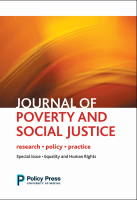
Journal of Poverty and Social Justice
Transforming insights into action for social change.Journal of Poverty and Social Justice, published by Policy Press, stands as a pivotal resource in the fields of Public Administration and Sociology and Political Science. With an impressive impact factor positioning it in the Q2 quartile for both disciplines as of 2023, this journal engages the academic community in critical discussions surrounding poverty, social justice, and the intricacies of policy-making. Released quarterly from its inception in 2010 and set to continue through 2024, it provides a platform for innovative research, case studies, and theoretical reflections that seek to address the multifaceted challenges of poverty and promote equitable social policies. Although not an open-access journal, it offers essential insights for researchers, professionals, and students alike, making it an indispensable reference for those committed to advancing knowledge in social justice and welfare reform.

Alternative Law Journal
Fostering Critical Discourse for a Just Society.Alternative Law Journal, published by SAGE Publications Ltd, stands as a pivotal platform for critical discourse within the fields of law, sociology, and political science. Since its inception in 2008, the journal has fostered innovative scholarship aimed at exploring the intersections of legal practices and social justice, making it an essential resource for researchers, practitioners, and students alike. With its current ranking at Q3 in both the Law and Sociology categories according to the latest Scopus metrics, the Alternative Law Journal ensures a robust academic discourse, promoting diverse perspectives and challenging conventional norms. The journal's address reflects its international reach, further underscoring its commitment to fostering a global dialogue on pressing legal and societal issues. This journal is crucial for anyone seeking to stay updated with contemporary thoughts and research impacting law and society.
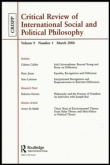
Critical Review of International Social and Political Philosophy
Cultivating Insightful Analyses for Today's ChallengesThe Critical Review of International Social and Political Philosophy, published by ROUTLEDGE JOURNALS, TAYLOR & FRANCIS LTD, stands as a pivotal platform in the realms of philosophy, sociology, and political science. With an impressive Q1 ranking in Philosophy and a Q2 ranking in the Social Sciences sector for 2023, the journal is uniquely positioned to explore and critique contemporary issues through a philosophical lens. Although it does not currently offer Open Access, its esteemed reputation is evident in its Scopus rankings: 136th in Arts and Humanities and 610th in Social Sciences, reflecting its substantial impact in these fields. Covering a broad spectrum of topics, the journal invites contributions that delve into theoretical explorations and empirical studies, aiming to foster critical discussions that resonate in today’s sociopolitical landscape. Published in the United Kingdom, the journal continues to serve as an essential resource for researchers, professionals, and students seeking to deepen their understanding of social and political thought.

Revista CES Derecho
Advancing Legal Discourse, One Article at a Time.Revista CES Derecho is a distinguished academic journal published by UNIV CES, focused on the multifaceted field of law. Situated in Medellin, Colombia, this journal serves as a vital platform for disseminating innovative research and critical analysis in legal studies, encouraging the exchange of ideas among scholars, practitioners, and students alike. With its commitment to open access, the journal provides unfettered access to its content, ensuring that its valuable insights reach a diverse audience. Although specific metrics such as H-Index and Scopus rankings are currently unavailable, the Revista CES Derecho aims to enhance the quality of legal education and practice by fostering scholarly discourse and informing progressive legal thought. Researchers and practitioners are invited to contribute to this dynamic publication, further enriching the discourse in the ever-evolving landscape of law.
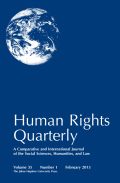
HUMAN RIGHTS QUARTERLY
Connecting academia with human rights practice.HUMAN RIGHTS QUARTERLY, published by Johns Hopkins University Press, stands as a pivotal forum for academics, policymakers, and practitioners dedicated to the study and advancement of human rights. Established in 1981, this esteemed journal addresses contemporary issues surrounding human rights norms and practices, fostering dialogue across diverse disciplines. With an impressive ISSN of 0275-0392 and E-ISSN of 1085-794X, it holds a significant place in the academic landscape, achieving a respectable Q3 ranking in both Social Sciences and Sociology and Political Science categories according to Scopus metrics. Although not an Open Access journal, it remains influential, with a robust readership and a commitment to disseminating critical research that promotes understanding and advocacy for human rights globally. As it converges varied scholarly perspectives from its inception through 2024, HUMAN RIGHTS QUARTERLY continues to inspire future generations of scholars interested in social justice and human rights advocacy.
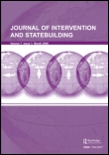
Journal of Intervention and Statebuilding
Advancing Insights into Statebuilding DynamicsJournal of Intervention and Statebuilding, published by Routledge Journals, Taylor & Francis Ltd, stands as a pivotal forum for the exploration and analysis of interventions and statebuilding processes across diverse geopolitical landscapes. With a distinguished Q1 ranking in both Law and Political Science and International Relations, this journal is recognized for its rigorous scholarship, offering profound insights into the intricacies of state transitions and international governance. Kept current with a focus on innovative theoretical and empirical research, the journal aims to bridge academic scholarship with policy implications, making it a vital resource for researchers, professionals, and students alike. The journal operates on a subscription basis, ensuring quality peer-reviewed content that contemplates the evolving dynamics of global governance. As it converges from 2014 to 2024, the Journal of Intervention and Statebuilding continues to foster dialogue and contribute to the scholarly discourse in an era of complex state interactions.

CRIME LAW AND SOCIAL CHANGE
Navigating the Complexities of Crime and Social EvolutionCRIME LAW AND SOCIAL CHANGE, published by SPRINGER, is a distinguished journal that caters to an interdisciplinary audience including researchers, professionals, and students in the fields of law, social sciences, and forensic medicine. With an ISSN of 0925-4994 and an E-ISSN of 1573-0751, this journal is a vital resource for those looking to explore the dynamic interplay between legal frameworks and societal change, particularly in relation to crime and its implications. As of 2023, it holds a commendable Q2 category ranking in Law and Social Sciences and a Q3 ranking in Pathology and Forensic Medicine, showcasing its impact within these vital domains. With its converged publication years from 1991 to 2024, CRIME LAW AND SOCIAL CHANGE is pivotal in advancing scholarly discourse and offering access to high-quality research that informs both policy and practice. Although not an open access journal, it provides valuable insights to its audience through rigorous peer-reviewed articles, making it an indispensable part of the academic literature in its respective fields.
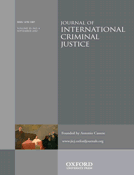
Journal of International Criminal Justice
Shaping the future of international criminal law through rigorous scholarship.The Journal of International Criminal Justice, published by Oxford University Press, serves as a vital platform for scholars and practitioners engaged in the multifaceted domain of international criminal law. With an ISSN of 1478-1387 and an E-ISSN of 1478-1395, this journal continues to thrive since its inception in 2005, boasting a strong focus on the interplay between law, sociology, and political science. Its prestigious rankings in the Q1 in Law and Q2 in Sociology and Political Science quartiles underscore its significance within these disciplines, reflecting a commitment to high-quality research and interdisciplinary dialogue. Researchers will find the journal invaluable, as it addresses pressing issues such as justice, accountability, and human rights on a global stage. While the journal is not open access, it is highly regarded for its rigorous peer-review process, contributing to informed discussions and developments in the field. With its strategic publishing location in the United Kingdom, the journal fosters international collaboration, making it an essential resource for anyone passionate about enhancing the understanding of international criminal law.
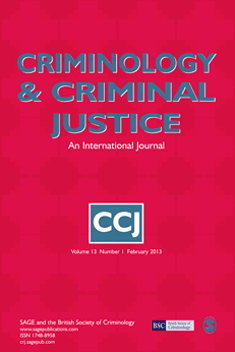
Criminology & Criminal Justice
Exploring Innovative Solutions in Crime and JusticeCriminology & Criminal Justice is a leading academic journal published by SAGE Publications Ltd that serves as an essential resource for scholars, practitioners, and students in the field of criminology and legal studies. With its ISSN 1748-8958 and E-ISSN 1748-8966, this journal has established itself as a crucial platform for innovative research, analysis, and discourse, consistently maintaining a prestigious Q1 ranking in Law. Spanning a diverse range of topics within criminology and criminal justice, it promotes interdisciplinary perspectives that reflect current trends and challenges within the domain. With a notable 93rd percentile ranking in Scopus, the journal ensures that its publications meet rigorous academic standards, fostering the advancement of knowledge and practice in the field. Based in the United Kingdom and catering to a global audience, this journal enhances scholarly communication and collaboration, making it an indispensable tool for those dedicated to unraveling the complexities of crime and justice.